The 3rd day of God’s work
The parched earth, the seas, the seeds, the trees, the fruit.
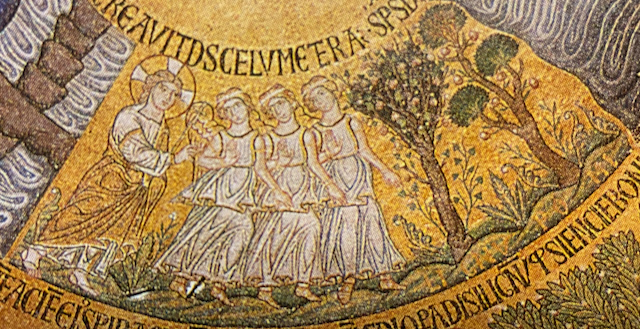
Day 3, Dome of Genesis. Basilica of San Marco, Venice (13th century). The seeds that become fruit-bearing trees represent the spiritual path of the human being who has found the good water of love to drink from. Thus, drawing from this source, what is sown within him begins to bear fruit, according to the works he accomplishes.
On the third day of creation, the third step towards love, towards faith, God helps us to pass from darkness to light, once again. On one side the parched earth, on the other the rough, salty seas. On this ground God will make seeds grow, which will become trees, which will bear fruit.
Let’s see what spiritual reality we’re talking about here, what a new stage, what a challenge for faith.
Behold, the earth that is not irrigated by water from above dries up, becomes arid, a desert. It is the human being who does not look to God or to the love of his neighbor, who is turned away from the source of life, lost in the desert.
His spirit is restless like the seas, in turmoil, he can’t head for calm waters, for the harbor, he’s at the mercy of the waves. He cannot drink from the only source of life, the love of God and neighbor.
So, God comes to the rescue of humanity lost in the desert, he will take care of this land, its vineyard, its trees, like a vinedresser, like a gardener. He comes to water, to straighten, to weed, to let it bring forth fruit. Many parables speak to us of this God who is a sower, a gardener, a vinedresser, who continues to scatter his word over the earth like seed. It’s up to us to welcome him, quite simply, to trust that he will take care of the growth and the fruit. It’s up to us to extend our roots towards the source of life, towards the love of God and neighbor. Jesus reminds us: “If a grain of wheat falls into the ground and does not die, it remains alone; but if it dies, it bears much fruit. Whoever is attached to his soul loses it; whoever does not attach importance to his soul in this world will keep it for eternal life.” (John 12:23-25). First of all, it was he who came to this earth, came down from the cross to the tomb and bore fruit. He showed us the way to the source of life, for there is no greater love than to lay down one’s life for those we love, so that we too can discover the greatest joy in the gift of our life, in the happiness of our neighbor. In the story of Genesis, it is through the word of God that the barren land receives seed, grows and bears fruit. In the parable of the sower, Jesus tells us that all we have to do is accept this word, treasure it and put it into practice, and that God will take care of everything else. Let’s take a look at this time of trial, when mankind learns to trust God’s Word and God’s work. Will we come to believe in his love? (For a more in-depth analysis of the biblical text, see the third day in the article Genesis 1:1 – 2:3 The seven days, stages of love).
The stages in the life of Jesus
The 40 days: Lent and Ascension
Lent: the forty years of the Hebrew people in the desert and the forty days of Christ in the desert.
A time to meditate on our earthly condition and its trials, and to direct our lives towards the hope of love’s victory over all evil, towards the mystery of Easter, of eternal life that makes us in the image and likeness of God.
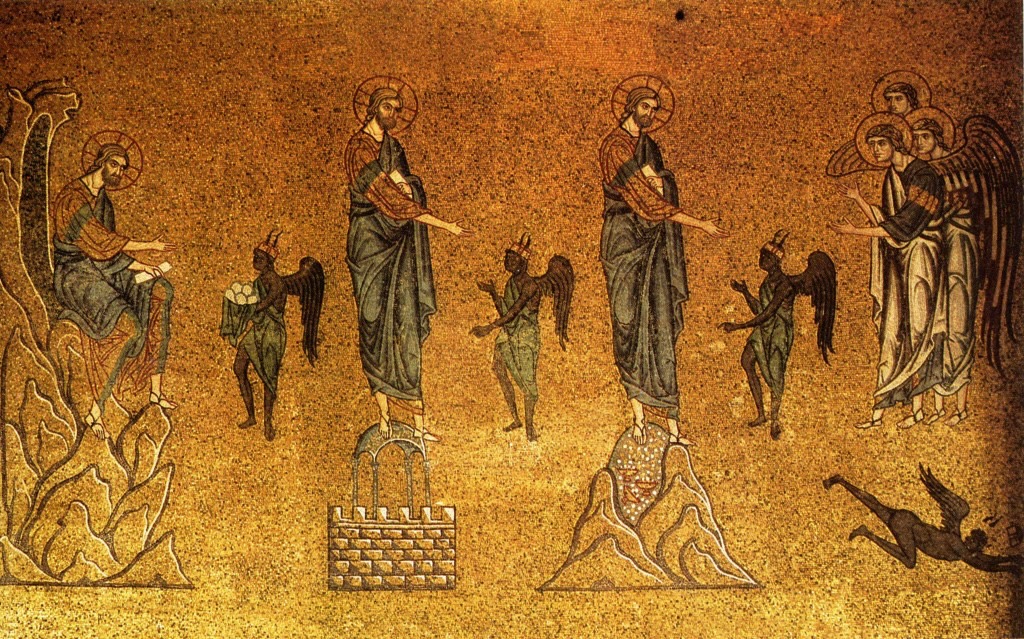
The temptations of Christ. Mosaic from Saint Mark’s Basilica, Venice (13th century). Jesus responds to temptation with the word of the Bible, showing that God’s word is a sure guide to victory over darkness. Thus, he responds to the tempter who offers him bread, that the Word of God is also food. When the devil takes him to the top of the Temple, inviting him to throw himself down so that the angels can come and rescue him, he replies that it’s not right to seek greatness by putting God to the test. And then, when the tempter offers him riches and power, he replies that we must worship God alone and therefore not pursue riches by turning away from the path of love of neighbor, of love of God.
Throughout the Bible, the number forty or four hundred refers to the duration of our earthly life, a time of trial. It can be forty years, as when the Hebrew people crossed the desert to reach the Promised Land, or forty days, as when Jesus was tempted in the desert. Or 40 days, as when, after his resurrection, he appeared to the apostles, instructed them and opened their minds to understanding the Scriptures, the Word of God. Indeed, they had to understand the divine language that speaks of spiritual reality through the images of the dynamics of nature and of our earthly life.
Let’s take a look at these three periods of forty years or days, one after the other. First, the one that tells us about the vicissitudes of the Hebrew people, who were enslaved for 400 years in Egypt and then freed from that slavery. These 400 years represent our human existence in darkness. Slavery is that of the human being imprisoned by the chain of violence, by the law of retaliation by virtue of which he responds to offense with offense. No forgiveness is possible, and humanity divided by egoism, rivalry and war cannot taste the joy of true, free love. It is from this slavery that God comes to liberate us, through the superabundance of his forgiveness, enabling human beings to glimpse a greater peace and joy in the gift of their own lives. This is how victory over evil is achieved. But then, once we have glimpsed the way out of slavery, once we have left Egypt and crossed the Salt Sea, towards the Promised Land, towards the glimpse of happiness, towards the source of living water, humanity must cross a desert. The desert of the human condition, deprived of God, deprived of the source of life and love that alone can unite us in the joy of being brothers and sisters, of being at the service of each other, of being members of the same body. Confrontation with the world, with the darkness of a lack of confidence in love, in the superabundance of divine life offered to us, will be the occasion of countless downfalls. Faced with hostility, human beings will be afraid, tempted to deny, to lie, rather than place their lives in God’s hands and love to the end. Faced with a scarcity of earthly goods, the human being will be tempted to appropriate them rather than find true nourishment in the wisdom of God’s word. Humbled, he will seek power by making alliances that may confer power or wealth, rather than serving God and his neighbor.
Here’s the gospel story that tells us Jesus also wanted to experience this trial, this confrontation with the world, to show us how to emerge victorious:
“Then Jesus was led by the Spirit into the desert to be tempted by the devil. After fasting for forty days and forty nights, he became hungry. The tempter came up to him and said, “If you are the Son of God, command these stones to become loaves of bread.” But Jesus replied, “It is written: Man does not live by bread alone, but by every word that comes from the mouth of God.”
Then the devil takes him to the Holy City, places him on top of the Temple and says to him, “If you are the Son of God, throw yourself down; for it is written, He will give his angels charge over you, and : They shall bear thee on their hands, lest thy foot dash against a stone.” Jesus declared to him, “Again, it is written, Thou shalt not put the Lord thy God to the test.”
The devil again takes him to a very high mountain and shows him all the kingdoms of the world and their glory. He said to him, “All this I will give you, if you will fall down at my feet and bow down to me.” Then Jesus said to him, “Get back, Satan! For it is written, ‘You shall worship the Lord your God, and him only shall you worship.'” So the devil left him. And behold, angels came and ministered to him.” (Matthew 4:1-11)
The Ascension: After the resurrection, Jesus appears to the apostles, instructs them and strengthens them in love, faith and understanding of the Word of God. A time to prepare to find God’s presence in our lives, when we can’t see him.
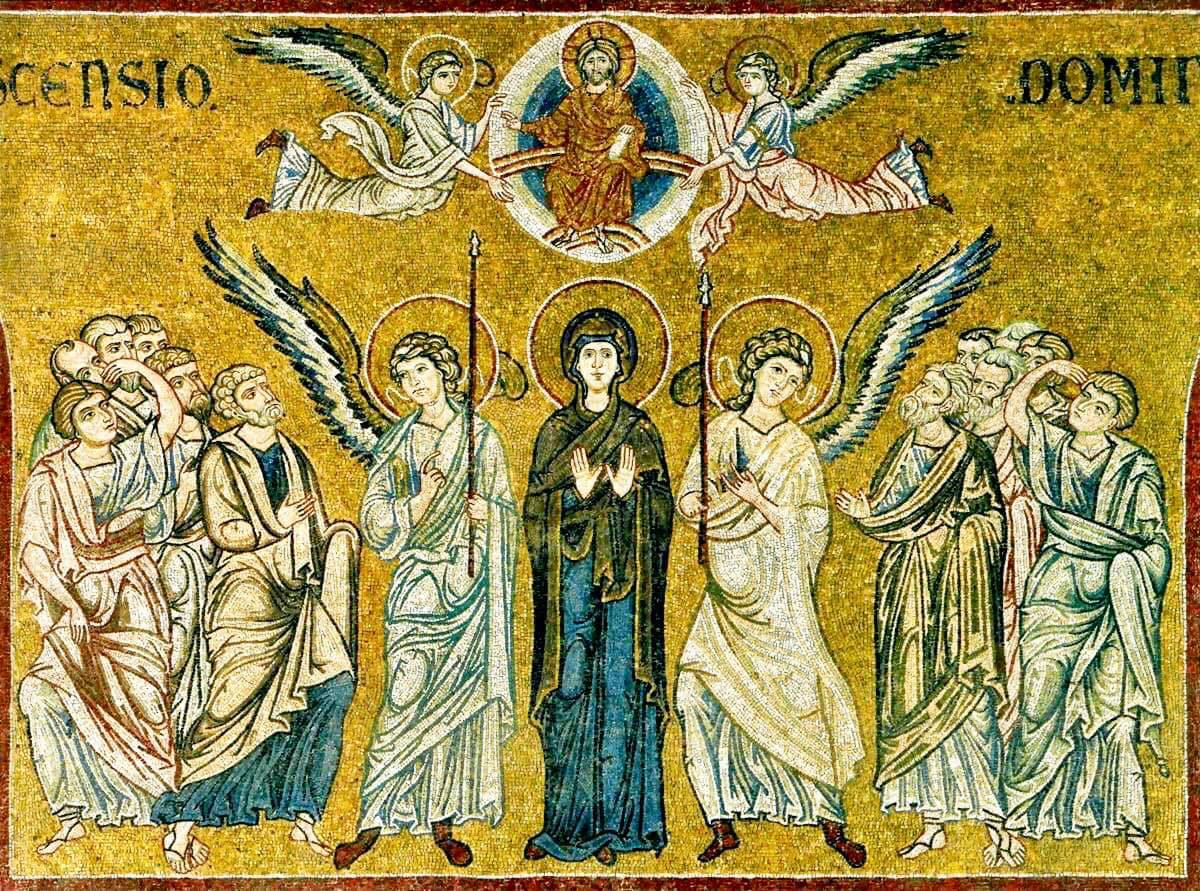
The Ascension of Jesus into Heaven. Mosaic from the Duomo of Monreale, Italy (12th century). Jesus promises the apostles to prepare a place for them in the Father’s dwelling, where a place is prepared for every one of his children. Thus, the apostles’ mission will be to invite other human beings to take their place in the Kingdom of God by welcoming their neighbor as a brother or sister. Mary, at the center of the story, was the first to respond to God’s invitation, to open the door and allow others to follow her example, trusting in God’s benevolence and love.
We saw in the story of Christ’s temptations that the answer to the various temptations is always found in God’s word. Jesus always responds to Satan by quoting other passages from the Bible, showing us the path to follow so that we too can conquer evil. Then, before his death and after the resurrection, Jesus warned the apostles of the persecutions they too would have to face. He wanted to prepare them again and again for these trials, and showed them how to understand the Scriptures, the Word of God. Indeed, it’s important to be able to understand the images God uses to speak to us about our spiritual life and reality, so that we too can recognize ourselves in them, for it’s in the Word of God that we find our way to the light. Now, this Word is not just words, but became flesh in Jesus Christ, so Jesus teaches his disciples to recognize his own eternal work in the words of the Bible, and to associate every moment of his earthly life with passages of Scripture that he came to fulfill in his own person, through his actions. The work of God that was not visible to mankind, yet very real, has now become visible in Jesus Christ. But more than that, Jesus promises that they too will be able to accomplish what he himself has accomplished; he promises that they too will lead humanity from darkness to light, that they too will reveal God’s love and forgiveness to the world. Indeed, little by little, with the help of Jesus and his Spirit, the Holy Spirit of love, they will realize ever more how much God has always loved us since the creation of the world, how he has loved all human beings and how he gives life to each and every one of them. And so, ten days after the Ascension, on the Day of Pentecost, they will be fully filled with this Spirit of love, and ready to bring it to the world. The test, then, also consisted in no longer seeing Jesus, no longer hearing his words, for on Ascension Day he would have withdrawn from their sight. But he also promised them that he would be with them all the days of their lives, that they would have a home with him, but how to find him? how to hear his way? how to find the way? By being as full of love as he is for every creature, by living his own love, his own life, by seeing every human being as a child of God. Then it will be possible for them to follow and do God’s will, serving and listening to everyone, caring for everyone, as the apostle Paul says:
“What then is my merit? It is that I preach the Gospel without seeking any material advantage, and without asserting my rights as a preacher of the Gospel. Yes, free with regard to all, I made myself the slave of all in order to win as many as possible. And with the Jews I was like a Jew, to win the Jews. With those who are subjects of the Law, I was like a subject of the Law, I who am not, to win the subjects of the Law. With the lawless, I have been like a lawless person, I who am not without God’s law, but under Christ’s law, to win over the lawless. With the weak, I was weak, to win the weak. I made myself all things to all people, to save a few at all costs. And all this I do for the sake of the Gospel, so that I too may share in it.” (1 Corinthians 9:18-23)
It is by following Christ, by imitating him, that we truly see the face of God in each one of us. It is by trusting him, by placing our lives in his hands, by allowing ourselves to be led by the calls of our neighbor, that we enter fully into our filial relationship with God. United with the Son, we enter into a filial relationship with the Father, we enter into the mystery of the Trinity’s exchange of love. In this way, we live the love of the Son who places his life in the hands of the Father, living the greatest love of all, that of the Holy Spirit.
Let’s take a look at Jesus’ conversation with the apostles at the last supper, before his death and resurrection, before their minds were opened to recognize the work of God in Jesus Christ. They are bewildered, they don’t see, they don’t know how to find him, how to find the way:
“Let not your heart be troubled: you believe in God, believe also in me. In my Father’s house there are many dwelling places; otherwise would I have said to you, ‘I am going to prepare a place for you’? When I have gone to prepare a place for you, I will come back and take you to myself, so that where I am, there you may be too. To go where I am going, you know the way.” Thomas said to him, “Lord, we don’t know where you’re going. How can we know the way?” Jesus replies: “I am the Way, the Truth and the Life; no one goes to the Father without passing through me. If you know me, you will know my Father too. Even now you know him, and have seen him.” Philip said to him, “Lord, show us the Father; that’s enough for us. Jesus replies, “I’ve been with you so long, and you don’t know me, Philip! He who has seen me has seen the Father. How can you say, ‘Show us the Father’? Don’t you believe that I am in the Father and that the Father is in me? The words I speak to you I do not speak of myself; the Father who dwells in me does his own works. Believe me: I am in the Father, and the Father is in me; if you don’t believe me, believe at least because of the works themselves. Amen, amen, I say to you: he who believes in me will do the works that I do. He will do even greater works, because I am going to the Father, and whatever you ask in my name, I will do, so that the Father may be glorified in the Son. When you ask anything in my name, I will do it. If you love me, you will keep my commandments. I will pray the Father, and he will give you another Helper who will be with you forever: the Spirit of truth, whom the world cannot receive, for it neither sees him nor knows him; but you know him, for he dwells with you and will be in you. I will not leave you orphans, I am coming back to you. Before long, the world will see me no more, but you will see me alive, and you too will live. In that day, you will know that I am in my Father, and you in me, and I in you. He who receives my commandments and keeps them, he it is who loves me; and he who loves me will be loved by my Father, and I will love him, and manifest myself to him.” (John 14, 1-21)
The relationship with God and with our neighbor
The tree that bears fruit in its time
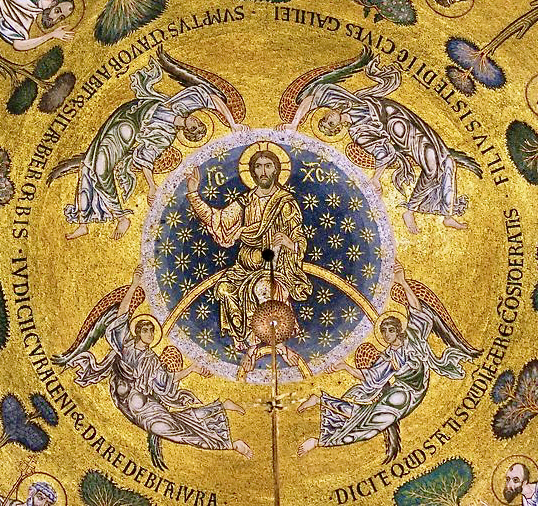
The Ascension dome, detail of Christ. Mosaic, Basilica of San Marco, Venice (13th century).
This is the central part of the mosaic in the dome of the Ascension in St. Mark’s Basilica in Venice. The text of the Gospel and of the Acts of the Apostles will help us to understand this image:
“Then he opened their minds to the understanding of the Scriptures. He said to them: ‘Thus it is written that Christ will suffer, that he will rise from the dead on the third day, and that conversion will be proclaimed in his name, for the forgiveness of sins, to all nations, beginning at Jerusalem. It’s up to you to be witnesses. And I will send upon you what my Father has promised. As for you, stay in the city until you are clothed with power from on high.” Then Jesus led them outside, all the way to Bethany; and, raising his hands, he blessed them. While he was blessing them, he separated from them and was taken up into heaven. They worshipped him, and returned to Jerusalem with great joy. And they were continually in the Temple blessing God.” (Luke 24, 45-53)
“Dear Theophilus, in my first book, I spoke of all that Jesus did and taught, from the moment he began, until the day he was taken up into heaven, after having, through the Holy Spirit, given his instructions to the Apostles he had chosen. It was to them that he presented himself alive after his Passion, and he gave them many proofs of this, since for forty days he appeared to them and spoke to them of the kingdom of God. During a meal with them, he instructed them not to leave Jerusalem, but to wait there for the fulfillment of the Father’s promise. He declared: “You have heard this promise from me: while John baptized with water, you will be baptized in the Holy Spirit within a few days. Thus gathered, the Apostles asked him, “Lord, is this now the time when you are going to restore the kingdom to Israel?” Jesus replied, “It is not for you to know the times and moments that the Father has set by his own authority. But you will receive power when the Holy Spirit comes upon you; then you will be my witnesses in Jerusalem, in all Judea and Samaria, and to the ends of the earth.” After these words, while the Apostles were looking at him, he rose up, and a cloud came to hide him from their eyes. And while they were still staring up at the sky where Jesus was going, behold, there stood before them two men in white garments, who said to them, “Galileans, why are you standing there looking up to heaven? This Jesus, who was taken up from you into heaven, will come in the same way as you saw him go into heaven.” (Acts 1:1-11)
Around Christ we see four angels and the Latin inscription that reads:
” Dicite quid statis quid i(n) etere co(n)sideratis filius iste D(e)i I(esus) C(hristus) cives galilei sumptus ut a vob(is) abiit (et) sic arbiter orbis iudicii cura veni(et) dare debita iura “, “Say, why do you remain scrutinizing in heaven, inhabitants of Galilee, this Son of God, Jesus Christ, who has ascended, and as he has departed from you, so he will come to be arbiter of the judgment of the world and to render the justice due to it.”
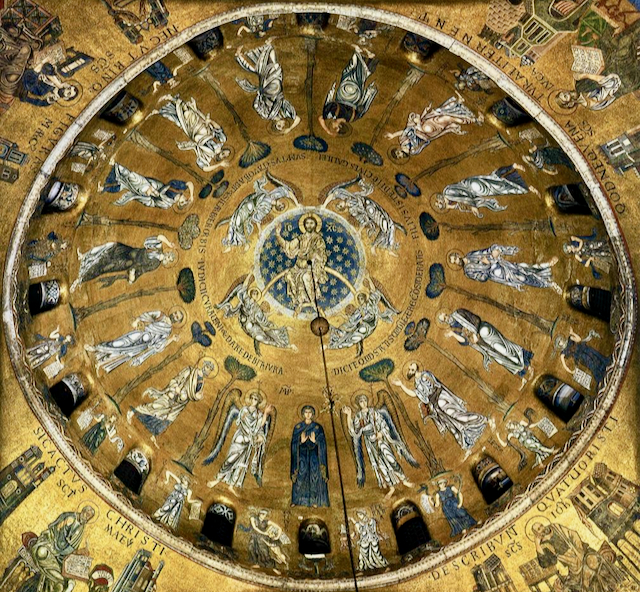
The dome of the Ascension. Mosaic, Basilica of San Marco, Venice (13th century). In the second circle: Mary with the apostles and the trees of life. In the third circle: the works of charity.
Extending the image to the whole dome, we see the link with the tree theme, the one referred to on the third day of creation, and it’s clear to us from the image that each tree is associated with an apostle. Indeed, those who find faith in Jesus Christ the Son of God are comparable to a tree that directs its roots towards the source of life, as Psalm 1 tells us:
“Blessed is the man who does not enter the council of the wicked, does not follow the path of sinners, does not sit with those who sneer, but delights in the law of the Lord and whispers his law day and night! He is like a tree planted by a stream, which bears fruit in its time, and never its foliage dies; whatever he undertakes will succeed, such is not the fate of the wicked. But they are like straw blown by the wind: at the judgment, the wicked will not rise, nor sinners at the gathering of the righteous. The Lord knows the way of the righteous, but the way of the wicked will be lost.”
Throughout the Bible, the righteous is compared to a tree, and it’s not just the baptized or the Jew who is called righteous, but every man who encounters God through service to his neighbor, even if he doesn’t know God or Jesus. Indeed, the evangelist Matthew reports the words of Jesus that describe what the angels announced to the apostles, that is, the words that Jesus will address to mankind at the resurrection of the dead, when all those who have not known him, who have not believed in him, will see him:
“When the Son of Man comes in his glory, and all the angels with him, then he will sit on his throne of glory. All nations will be gathered before him; he will separate men one from another, as the shepherd separates the sheep from the goats: he will place the sheep on his right, and the goats on the left. Then the King will say to those on his right: “Come, you blessed of my Father, inherit the kingdom prepared for you since the foundation of the world. For I was hungry, and you gave me to eat; I was thirsty, and you gave me to drink; I was a stranger, and you welcomed me; I was naked, and you clothed me; I was sick, and you visited me; I was in prison, and you came to me!” Then the righteous will answer him, “Lord, when did we see you…? so you were hungry, and we fed you? so you were thirsty, and we gave you something to drink? so you were a stranger, and we welcomed you? so you were naked, and we clothed you? so you were sick or in prison… when did we come to you?” And the King will answer them, “Amen, I tell you: whenever you did it to one of the least of these brothers of mine, you did it to me.” ( Matthew 25:31-40)
So it’s Jesus himself who tells us that human beings who don’t know him will nonetheless have experienced God through love of their neighbor, and in so doing will have encountered God.
The righteous person, whether believer or non-believer, is therefore compared to a tree that bears fruit in its own time, i.e. he is not concerned with the fruit, with how much or whether it bears fruit, i.e. he does not seek a reward, but offers free love, and it is this love, which is given without expecting anything in return, that enables the tree, the righteous person, to drink from the source of life, of love, of divine joy. This source gushes forth within him when he contemplates and desires the happiness of his fellow man, and this is how he will be filled with joy, just as parents are filled with the smile and gratitude of their children. This tree has directed its roots to the source of living water, to the service of neighbor, just like the tree of life that is Jesus when he offers his life on the cross for the salvation of the world. Now, in the vision offered to us of this divine reality by the mosaic and by the words of the Gospel, we contemplate the glory of Christ in heaven, the angels who direct and guide humanity towards heavenly, spiritual realities, the apostles who are like trees offering us their fruit, God being the gardener who, through the events of their lives, prepares and disposes them to bear fruit, watering, cutting, preparing the ground, straightening.
Now, in the midst of the apostles, at the center of the image, we see Mary, surrounded by the archangels Michael and Gabriel, whose word from God she welcomed with faith and trust throughout her life. In this way, these angels guided her towards ever greater understanding and trust, so that at the moment of trial, after Christ’s death, it was she who held the apostles together, encouraging them and guiding them towards the hope of the resurrection.
And in the successive circle, sixteen female figures represent the virtues, i.e. all the ways of listening to and serving one’s neighbor. It is through these works of charity, of gratuitous love, that each person can contemplate the face of God, that is, experience God through a love equal to his own, animated by his Spirit, the Spirit who gives life to the world and leads the human being, created in God’s image, towards full likeness to him.
Here are the names of the sixteen figures, works of charity, virtues and beatitudes:
Hope, Faith, Justice, Strength, Temperance, Prudence, Humility, Gentleness, Contrition, Abstinence, Mercy, Patience, Chastity, Modesty, Constancy, Charity.
Charity (at 9 o’clock in the frame), crowned and clothed in royal vestments, is the mother of all virtues, according to the inscription to her right. This is the free love without which all the rest is nothing, if all these qualities are not moved by love, by the greatest love, as the apostle Paul tells us:
“I could speak all the languages of men and of angels, but if I do not have charity, if I lack love, I am but a resounding brass, a clanging cymbal. I could be a prophet, have all the science of the mysteries and all the knowledge of God, I could have all the faith to move mountains, if I lack love, I am nothing. I could distribute all my fortune to the starving, I could burn myself alive, but if I lack love, I’m useless. Love is patient; love is helpful; love isn’t jealous; it doesn’t boast or puff itself up; it doesn’t do anything unseemly; it doesn’t seek its own interests; it doesn’t get carried away; it doesn’t hold grudges; it doesn’t rejoice in what’s unjust, but finds its joy in what’s true; it puts up with everything, trusts everything, hopes everything, endures everything. Love will never pass away. Prophecies will be outdated, the gift of tongues will cease, present knowledge will be outdated. Indeed, our knowledge is partial, our prophecies are partial. When the completion comes, that which is partial will be surpassed. When I was a little child, I spoke like a child, I thought like a child, I reasoned like a child. Now that I’m a man, I’ve gone beyond what was childish. At present, we see in a confused way, as if in a mirror; on that day, we shall see face to face. At present, my knowledge is partial; on that day, I shall know perfectly, as I have been known. What remains today is faith, hope and love; but the greatest of the three is love.” (1 Corinthians 13:1-13).
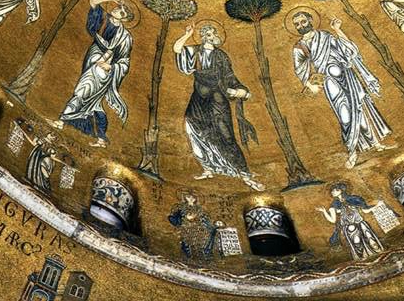
Holy Week:
They try to set traps for Jesus

The carefree virgins and the provident virgins. Mosaic on the façade of Santa Maria in Transtevere (13th century). The parable of the ten virgins waiting for the bridegroom tells us that only those who have oil in their lamp will be able to recognize him in the night. This means that in order to know God, who is love, we ourselves must love our neighbor, so that the oil, which represents the power of the Holy Spirit who penetrates us, will make us shine in the night, strengthen us in our trials and enable us to know God.
We see that works of charity are accompanied by difficulties and hardships. The first illustrious martyrs were often deacons, like Saint Stephen in the Acts of the Apostles. Indeed, it was deacons who were the most exposed, the most visible, since they were involved in serving the poor, sharing the offerings of the faithful and distributing them to the needy, visiting the sick and preaching the Gospel. So they exposed themselves to the same accusations as Jesus: it’s the light that makes the shadow appear even more obvious. So, on the third day of his entry into Jerusalem, Jesus will be continually assailed by those who try to set traps for him, by putting him in difficult situations, by asking him questions so that they can then accuse him. At the same time, if we analyze the traps that are set for Jesus in order to catch him at fault, we see once again, as in the temptations in the desert, how love responds to each different temptation. This brings us back to the characteristics of love enumerated by St. Paul: love is patient, helpful, not jealous, not boastful, not puffed up with pride, not unseemly, not self-interested, not hot-tempered, not resentful, not rejoicing in what is unjust, but finding joy in what is true, bearing all things, trusting all things, hoping all things, enduring all things. Of course, all these virtues that Jesus puts into practice make the opposite attitude of those who put him to the test all the more apparent. Several chapters of the Gospels recount Jesus’ conversations and confrontations with his adversaries during his last days in Jerusalem. Let’s follow Matthew’s account, starting on the third day of Holy Week:
– It tells of a fig tree that bears no fruit. It is the image of all that is to come: human beings, caught up in rivalries and jealousies, bear no good fruit, they are harmful. Just as darkness cannot resist light, the fire of love that Jesus brings to the world consumes his adversaries, brings evil to light, and makes it possible to discern between good works that bear fruit and those that generate murder and conflict. The faith that endures trials and does not give in to evil is victorious (see Matthew 21:19-21).
– In the Temple, the chief priests question Jesus about the works he performs: is it God who gives him the power to perform these wonders, or is it human knowledge? with what authority does he do all this? Jesus answers them with the example of John the Baptist, to whom crowds flocked to ask forgiveness for their sins, to be converted, just as public sinners are converted and follow Jesus. These are the fruits that help us judge whether a work is from God or from men seeking profit or interest. Jesus also tells them parables about those who do God’s will and work in his vineyard, and those who do not do God’s will and persecute and kill those who come from God. So, do Jesus’ miracles bear fruit that can be seen in others, is there any good being done in the hearts of human beings, or as in the devil’s first temptation in the desert, has he done it for personal gain? Indeed, the devil said to Jesus: “Turn this stone into loaves of bread”, and Jesus replied by saying that his food, his reward, is to do God’s will, i.e. the reward is in love, not in profit, earthly advantage. (Matthew 21:23-46).
– They try to trap Jesus by making him talk about Caesar: is it legitimate to pay taxes to Caesar? Doesn’t this contradict the exclusive worship of God? Doesn’t this mean putting oneself at the service of a human authority and not of God? This too echoes the devil’s temptation in the desert: Prostrate yourself before me and I will give you all the riches of the world. But Jesus, by showing that the coins bear the image of Caesar, shows that this apparent wealth belongs to Caesar, that his real treasure lies elsewhere, in the service of God, and that it is he alone that Jesus serves (Matthew 22:15-46).
– Finally, Bible experts try to interpret God’s Word to their advantage, to justify bad practices, and Jesus will reply to them, just as he had replied to the devil in the desert, that we must not put God to the test, i.e. seek justifications for what we do wrong, even claiming that this is a service we are rendering to God. In fact, Jesus criticizes many religious practices that had been imposed on the faithful by experts in the Word of God in order to enrich themselves or to profit by the submission of the people, thus guaranteeing the Romans that the population would not rise up against them. This is putting God to the test by hypocritically claiming that what we do wrong comes from God’s will, that we are doing it for Him. Jesus denounces the hypocrisy of those who claim to be God’s servants, but pursue their own interests. The other evangelists also recount the episode of the poor widow who gave her last two small coins to the Temple as alms, placing her life solely in God’s hands. This gesture was genuine, it came from great faith, but no one can notice it, only God knows it. And so Jesus highlights it, criticizing the hypocrisy of those who ostensibly put money in the treasury for human gain rather than to pay homage to God (Matthew 21, 1-4).
Many parables follow these episodes in which Jesus is put to the test. He will speak, again to denounce the hypocritical attitude of those who seem to be serving God in appearance, but do not serve Him concretely either by their works or in their hearts. He will thus speak of the one who is invited to the wedding feast, but does not wear the wedding garment; he will be thrown out. This means that it’s not enough to say Lord, Lord, but that our actions must also correspond and express our faith. This is the meaning of the wedding garment: to be clothed in acts of righteousness, to be clothed in Christ, to be at the service of our neighbor. Only in this way can we participate in this meal, which is an expression of deep communion and love between the guests. In the heavenly banquet of the Kingdom of Heaven, in this wedding feast where humanity is united with God, all celebrate love, all are gathered in the name of love. If we don’t love our neighbor, it’s not possible to be in communion with him, it’s not possible to be seated at the same table that celebrates love. It’s a meal of covenant, of communion, of thanksgiving for the love that unites us to one another. (See the parable about the wedding garment in the article on Matthew 22:1-14 The wedding garment and the related articles about the Eucharistic meal.
It’s the love between mankind and God that’s at the heart of the parables of the wedding feast. He who does not love does not know God. On the contrary, he who loves his neighbor is united with God, animated by his love. Jesus offers another parable that speaks of the betrothal between God and humanity. Indeed, when the prophets bring the word of God to the people, God tells them to address the people by calling them “my betrothed, my beloved.” In the same way, Jesus speaks to us of brides waiting for the bridegroom, in the parable of the ten virgins: “Five of them were careless, and five were far-sighted” (Matthew 25:2). Indeed, they waited for the bridegroom in the night, five of them had no oil in their lamps and in the darkness were unable to find him, to recognize him, since they didn’t accomplish any deed of charity, they couldn’t recognize God who is love. Once again, as in the stages of love, in the seven days that tell us of God’s work to lead humanity from darkness to light, here too light enables us to see God. According to tradition, the oil that is essential to light is that which penetrates the human body and spirit deeply and fills it with love, intelligence, wisdom, strength, perseverance, hope and trust. These are all the gifts we need to put to work in order to be able to love God and our neighbor: “You shall love the Lord your God with all your heart, with all your soul, with all your strength and with all your thoughts, and your neighbor as yourself. This is the greatest and the first commandment. The second is like it: You shall love your neighbor as yourself.” (Matthew 22:37-39). This spirit of love must be translated into action, into deeds, so that it illuminates our neighbor. It’s when we can recognize God’s presence in our neighbor that we catch a glimpse of his light. This oil that penetrates us and strengthens our spirit is the very oil of the divine Spirit that urges us to find God’s presence in our neighbor. (See Matthew 25:1-13 here above).
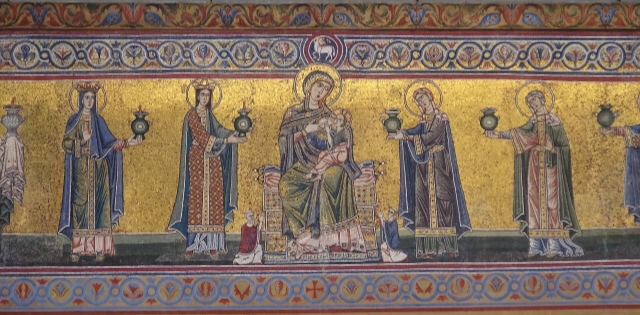
The carefree virgins and the provident virgins, detail. Mosaic on the façade of Santa Maria in Transtevere (13th century).
Phrase of the Lord’s Prayer:
Thy kingdom come
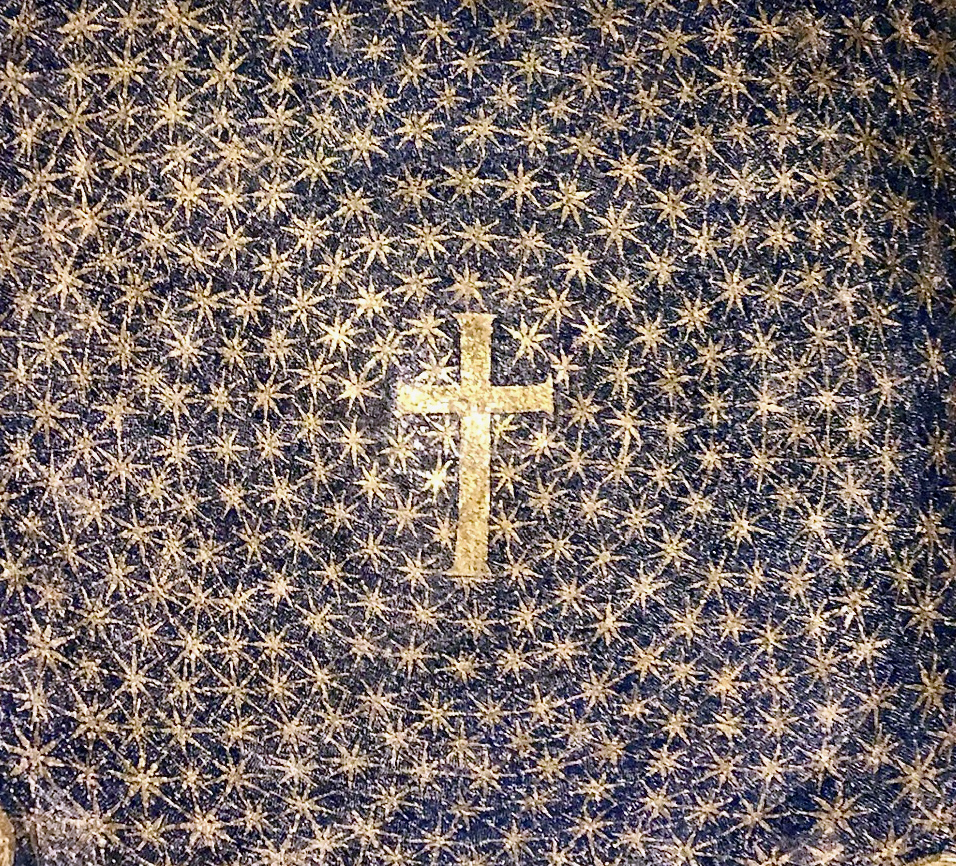
The cross surrounded by stars. Mausoleum of Galla Placidia, Ravenna, Italy (5th century). An image of the Kingdom of heaven, the light and love of Christ has filled the hearts of his followers, who in turn shine like stars in the darkness, victorious over evil and death. Their hearts have not yielded to hatred, they have not answered offense with offense, the Holy Spirit has sustained them in trial.
In the prayer of the Our Father, all the stages of our spiritual life are presented to us, and we ask God to help us live them. They sum up the whole meaning of our lives. The request for the Kingdom of God is the one that enables us to accept life as God proposes it to us. He is “the way, the truth and the life” (John 14:6). How is it possible to live in this world and at the same time be in the Kingdom of God? What does this request really mean? When the apostle Paul invites us to pray 24 hours a day, he may well have in mind this request: to seek to live every moment in communion with God, to love our neighbor as he loves us. In the Kingdom of God, there is perfect communion and love between human beings. How is it possible to live this communion on earth? Isn’t the Kingdom of God in heaven? Isn’t it the Kingdom of heaven? But heaven is the image of our spiritual life, and Jesus tells us: ” For behold, the kingdom of God is withinyou” (Luke 17:21). The Kingdom of God is the presence of Christ within us, the presence of his love, which enables us to love everyone as Jesus loves him. So, no matter what hostility, persecution or trials we face, let’s look at what the apostle Paul has to say:
“But if Christ is in you, the body is still marked by death because of sin, but the Spirit gives you life, because you have become righteous. And if the Spirit of him who raised Jesus from the dead dwells in you, he who raised Jesus, the Christ, from the dead will also give life to your mortal bodies through his Spirit who dwells in you. So then, brethren, we owe a debt, but it is not to the flesh for having to live according to the flesh. For if you live according to the flesh, you will die; but if, by the Spirit, you kill the doings of sinful man, you will live. Indeed, all those who allow themselves to be led by the Spirit of God are sons of God. You have not received a spirit that makes you slaves and brings you back to fear; but you have received a Spirit that makes you sons; and it is in him that we cry “Abba!”, that is to say: Father! So it’s the Holy Spirit himself who attests to our spirit that we are children of God. Since we are his children, we are also his heirs: heirs of God, heirs with Christ, if at least we suffer with him so as to be with him in glory. Indeed, I believe that there is no comparison between the sufferings of the present time and the glory that will be revealed to us. Indeed, creation eagerly awaits the revelation of the sons of God. For creation was subjected to the power of nothingness, not of its own free will, but because of the one who delivered it to that power. Yet it has kept the hope that it too will be freed from the slavery of degradation, to know the freedom of the glory given to the children of God. As we well know, the whole of creation is groaning, going through the pains of childbirth that are still ongoing. And not only that, but we ourselves, who have the firstfruits of the Spirit, we also groan within ourselves as we wait for adoption, the redemption of our bodies. For we have been saved, but in hope; to see what we hope for is no longer to hope: what we see, how can we still hope for it? But we, who hope for what we do not see, wait for it with perseverance. What’s more, the Holy Spirit comes to the rescue of our weakness, because we don’t know how to pray properly. The Spirit himself intercedes for us with inexpressible groans. And God, who scrutinizes hearts, knows the Spirit’s intentions, since it is according to God that the Spirit intercedes for the faithful. As we know, when men love God, God makes everything work for good for them, since they are called according to the design of his love. Those whom he knew beforehand, he also destined beforehand to be configured in the image of his Son, so that this Son might be the firstborn of a multitude of brothers. Those whom he destined in advance, he also called; those whom he called, he made righteous; and those whom he made righteous, he gave them his glory. What more is there to say? If God is for us, who will be against us? He did not spare his own Son, but delivered him up for us all: how could he, with him, fail to give us everything? Who will accuse those whom God has chosen? God is the one who makes righteous: who then can condemn? Christ Jesus has died; what’s more, he has risen, he is at God’s right hand, he intercedes for us: so who can separate us from Christ’s love? distress? anguish? persecution? hunger? destitution? danger? the sword? Indeed, it is written: For your sake we are slaughtered all the time, treated like sheep for the slaughterhouse. But in all this we are the great winners, thanks to him who loved us. Of this I am certain: neither death nor life, neither angels nor principalities, neither the present nor the future, neither powers nor heights nor depths, nor any other creature, will be able to separate us from the love of God which is in Christ Jesus our Lord.” (Romans 8:10-39)
So here we are, in our daily lives, even in the midst of worries, difficult situations, conflicts and trials, we can ask God for his kingdom to come into our hearts, within us, so that love may be victorious, so that it may truly reign, so that jealousy, hatred and resentment may not win over our hearts, so that we may always aspire to the life of the Kingdom. May our petitions open our hearts to God’s wisdom, may the Holy Spirit give us a glimpse of the right attitude towards our neighbor, may these gospel pages where we see Jesus under attack from all kinds of contradictions inspire us and be a model for us.